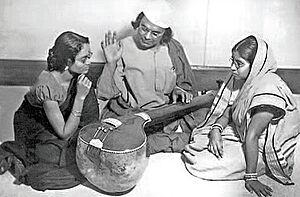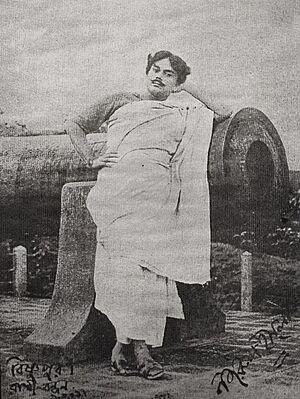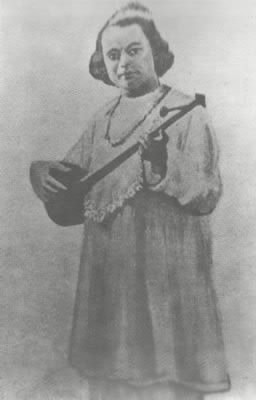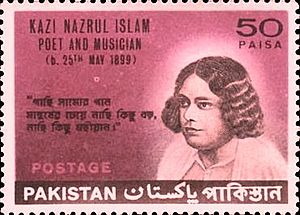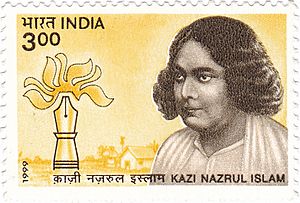Kazi Nazrul Islam facts for kids
Quick facts for kids
Bidrohī Kôbi (Rebel Poet)
Kazi Nazrul Islam
|
|
|---|---|
| কাজী নজরুল ইসলাম | |
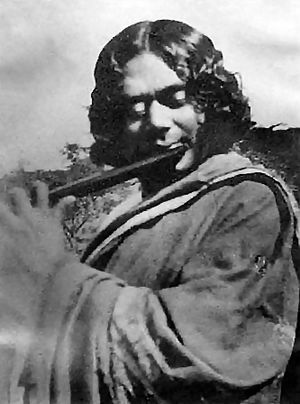
Nazrul in Chittagong, 1926
|
|
| Personal details | |
| Born | 11 Joiṣṭhyô, 1306 Bônggabdô 26 May 1899 Churulia, Asansol, Bengal Presidency, British India (present-day Paschim Bardhaman district, West Bengal, India) |
| Died | 29 August 1976 (aged 77) Dhaka, Bangladesh |
| Resting place | Mausoleum of Kazi Nazrul Islam |
| Citizenship | British Indian (1899 – 14 August 1947) Indian (15 August 1947 – 29 August 1976) Bangladeshi (18 February 1976–29 August 1976) |
| Political party | Workers and Peasants Party |
| Spouses |
|
| Children |
|
| Occupation |
|
| Awards |
|
| Signature | |
| Nicknames | Bengali: দুখুমিঞা, তারাক্ষ্যাপা, romanized: Dukhumiañ, Tarakkhyapa |
| Military career | |
| Allegiance | |
| Service/ |
|
| Years of service | 1917–1920 |
| Rank | Havildar (Sergeant) |
| Unit | 49th Bengal Regiment |
| Battles/wars | First World War |
Kazi Nazrul Islam (Bengali: কাজী নজরুল ইসলাম; 24 May 1899 – 29 August 1976) was a famous Bengali poet, writer, and musician. He is known as the national poet of Bangladesh. Many people think he is one of the greatest poets in Bengali literature.
Nazrul was often called the "Rebel Poet" (Bidrohī Kôbi). This was because he wrote about big ideas like fairness, justice, and fighting against unfair rules. He also wrote about love and religious faith. His songs are very popular and are known as Nazrul Geeti.
He was born into a Muslim family in what is now West Bengal, India. As a young man, he worked at a mosque and learned about poetry and drama. He even joined the British Indian Army for a few years. After the army, he became a journalist. He wrote strong poems and articles against the British Raj (British rule in India). Because of his writings, he was often put in prison.
Nazrul's writings talked about freedom and kindness. He was against any kind of unfairness, whether it was based on religion, social class, or gender. He wrote short stories, novels, and essays, but he is most famous for his songs and poems. He also brought a type of song called ghazal to the Bengali language.
In 1942, when he was 43, Nazrul became very ill. He lost his voice and memory. Doctors later said he had a rare brain illness. His health got worse, and he lived quietly for many years. In 1972, he moved to Dhaka, Bangladesh. He passed away four years later, on 29 August 1976.
Contents
Who Was Kazi Nazrul Islam?
Kazi Nazrul Islam was a very important figure in Bengali culture. He was a poet, writer, and musician. He is known as the national poet of Bangladesh. His works often focused on themes of equality, justice, and rebellion.
He was called the "Rebel Poet" because he wrote poems like "Bidrohī" (meaning "The Rebel"). His songs, known as Nazrul Gīti, are a special kind of music. They are still very popular today.
His Early Life
Nazrul was born on May 24, 1899, in a village called Churulia in British India. His family was Muslim. His father was an imam (a leader in a mosque). When Nazrul was ten, his father died. Nazrul then took his father's place to help his family.
He loved folk theatre and joined a traveling group. He learned to act, write songs, and poems for plays. Through this, he also studied Bengali and Sanskrit literature. He even wrote plays for the group.
In 1910, Nazrul went to school. He was inspired by his teachers and loved to learn. He studied Bengali, Sanskrit, Arabic, and Persian. He also learned about Hindustani classical music.
In 1917, at 18, Nazrul joined the British Indian Army. He wanted adventure and was interested in politics. He was sent to Karachi. Even though he didn't fight, he wrote his first poems and stories there. He read works by famous poets like Rabindranath Tagore and Persian poets like Hafez.
Becoming a Rebel Poet
Nazrul left the army in 1920 and moved to Calcutta. He started working for a literary society. He published his first novel, Bandhan-hara, and his first collection of poems. These works were well-liked.
He became friends with other young Muslim writers. Nazrul did not have a formal education like Rabindranath Tagore. Because of this, some people criticized his poems. But Nazrul still looked up to Tagore as a mentor.
In 1922, Nazrul became very famous with his poem Bidrohi (The Rebel). This poem showed his rebellious spirit. It was published in a magazine called Bijli (Lightning). The poem's strong words and theme were very popular. This was also when people were fighting for independence from British rule.
He then wrote Pralayollas ('Destructive Euphoria') and his first book of poems, Agnibeena ('Lyre of Fire'). These were also very successful. He also published short stories and essays.
Nazrul started a magazine called Dhumketu ('Comet') in 1922. It spoke out against the British Empire. The British authorities became suspicious of him. After he published a political poem, the police raided his office. Nazrul was arrested in January 1923 and accused of speaking against the government.
While in prison, Nazrul wrote many poems and songs. He even went on a 40-day hunger strike to protest how he was treated. He was released in December 1923. The British government banned many of his writings during the 1920s. His book Bisher Banshi ('The Flute of Poison'), published in 1924, was banned because it called for rebellion. People still read and shared it secretly.
Nazrul also criticized religious extremism. He believed in freedom and equality for everyone. He joined a political party that wanted independence from the British. He also helped start the Workers and Peasants Party. This party worked for national freedom and helped working-class people.
In 1924, Nazrul married Pramila Devi. She was a Hindu woman. Some religious leaders from both sides criticized their marriage. But Nazrul's popularity as the "rebel poet" grew even more.
His Amazing Music
Nazrul wrote and composed music for thousands of songs. These songs are known as Nazrul Geeti. Many of them were recorded and played on the radio. He also helped bring a type of song called ghazal to Bengali music.
His Islamic songs became very popular, especially during Ramadan. He also wrote devotional songs for Hindu gods and goddesses, like the Goddess Kali. He composed many Shyamasangeet and Bhajan songs, which are Hindu devotional music.
In 1928, Nazrul started working for a gramophone company. He wrote lyrics, composed music, and directed music. His songs were played on radio stations all over India.
Nazrul believed that women and men were equal. He showed this in his poem "Naari" (Woman). He wrote that both men and women are equally important for life and for great achievements. He also wrote about the struggles of poor working people in his poems, like "Daridro" (Poverty).
His Beliefs and Ideas
Nazrul was born a Muslim, but he believed that all religions were important. He often combined ideas from different religions in his works. He wrote that arguments between religions were often caused by religious leaders, not by ordinary people.
He strongly criticized religious extremism. He believed in human equality above all else. He wrote about the teachings of the Qur'an and Muhammad. He was also the first Muslim poet to use figures from Muslim history in his poems.
Nazrul's mother died in 1928. His second son, Bulbul, died from smallpox the next year. These losses made him very sad. His writings then started to explore religious themes more deeply. He wrote Islamic devotional songs about prayer, fasting, pilgrimage, and charity. These songs helped bring Islamic devotional music into mainstream Bengali music.
He also wrote over 500 Hindu devotional songs. Some Muslims criticized him for writing Hindu songs, and some Hindus were unhappy that a Muslim wrote about their goddesses. But Nazrul's poetry and songs explored the ideas of both Islam and Hinduism. He was a strong believer in humanism, which means believing in the value of all humans. He even gave his sons names from both Hindu and Muslim traditions.
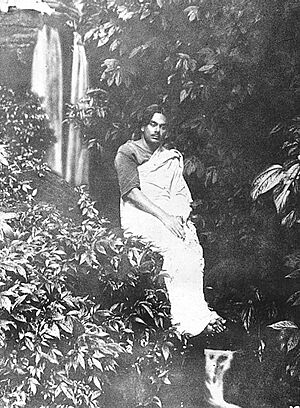
Later Years and Legacy
In 1930, another one of his books, Pralayshikha, was banned. He was sent to jail again but was released in 1931. Between 1928 and 1935, he published many songs. He wrote over 2,600 songs in total. Many of his songs were based on folk tunes and had beautiful poetry. He also wrote poems for children.
Nazrul also worked in Indian theatre and the early film industry. He directed his first film, Dhruva Bhakta, becoming the first Muslim director of a Bengali film. He also worked as a music director for other films and plays. In 1939, he started working for Calcutta Radio, managing music programs.
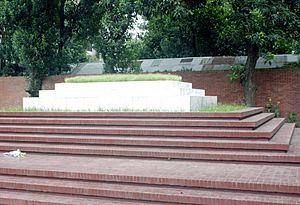
In 1939, Nazrul's wife, Pramila Devi, became very ill and was paralyzed. To pay for her medical care, he mortgaged his earnings from his music and writings. He also returned to journalism in 1940.
After the death of Rabindranath Tagore in 1941, Nazrul wrote two poems in his memory. Soon after, Nazrul himself became ill. He slowly lost his ability to speak. His health got worse, and he became very sad. He was admitted to a mental hospital in 1942.
In 1952, he was moved to a psychiatric hospital. His admirers helped send him to London and Vienna for treatment. Doctors there said he had a rare brain illness called Pick's disease, which was incurable. Nazrul returned to Calcutta in 1953. His wife Pramila died in 1962. Nazrul stopped working because of his illness.
On May 24, 1972, the new country of Bangladesh invited Nazrul to live in Dhaka. In 1976, he became a citizen of Bangladesh. Even with care, his health did not get better. His youngest son died in 1974. Nazrul passed away on August 29, 1976. He was buried next to a mosque at the Dhaka University, as he had wished in one of his poems. Bangladesh had two days of national mourning for him.
His Impact and Honors
Nazrul's poetry is known for its strong language and deep feelings. He often wrote freely, without worrying too much about perfect structure. Some people criticized him for being too proud, but his fans say he was just confident. They admire how he could question traditional ideas of God while still being truly devoted.
Nazrul's work is seen as strong and unique, different from Tagore's more refined style. He used many Persian words in his poems, which was sometimes debated, but it made his work richer.
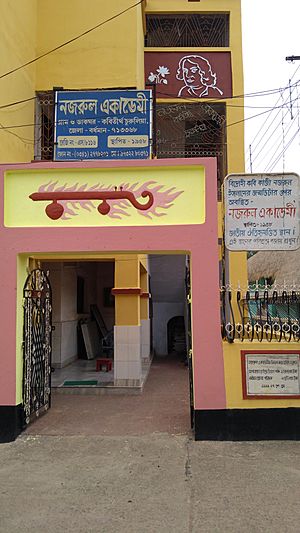
The government of Bangladesh named him the "national poet" in 1972. He received many awards, including the Padma Bhushan from India in 1960. Many schools and cultural centers in Bangladesh and India are named after him. The Bangladesh Nazrul Sena is a group that helps educate children.
Nazrul's writings for children are loved for their rich language and imagination. He is also remembered for his belief in secularism, meaning he respected all religions. His poems have been translated into many languages, like English and Spanish.
There are many places named after him, including a major road in Dhaka, universities, and even an airport. There is also a cultural center called Nazrul Tirtha in India dedicated to his memory. In 2020, Google celebrated his 121st birthday with a special Google Doodle.
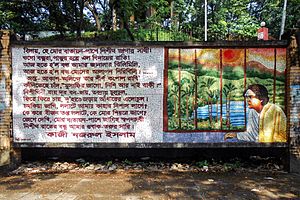
See also
 In Spanish: Kazi Nazrul Islam para niños
In Spanish: Kazi Nazrul Islam para niños
 | Isaac Myers |
 | D. Hamilton Jackson |
 | A. Philip Randolph |


